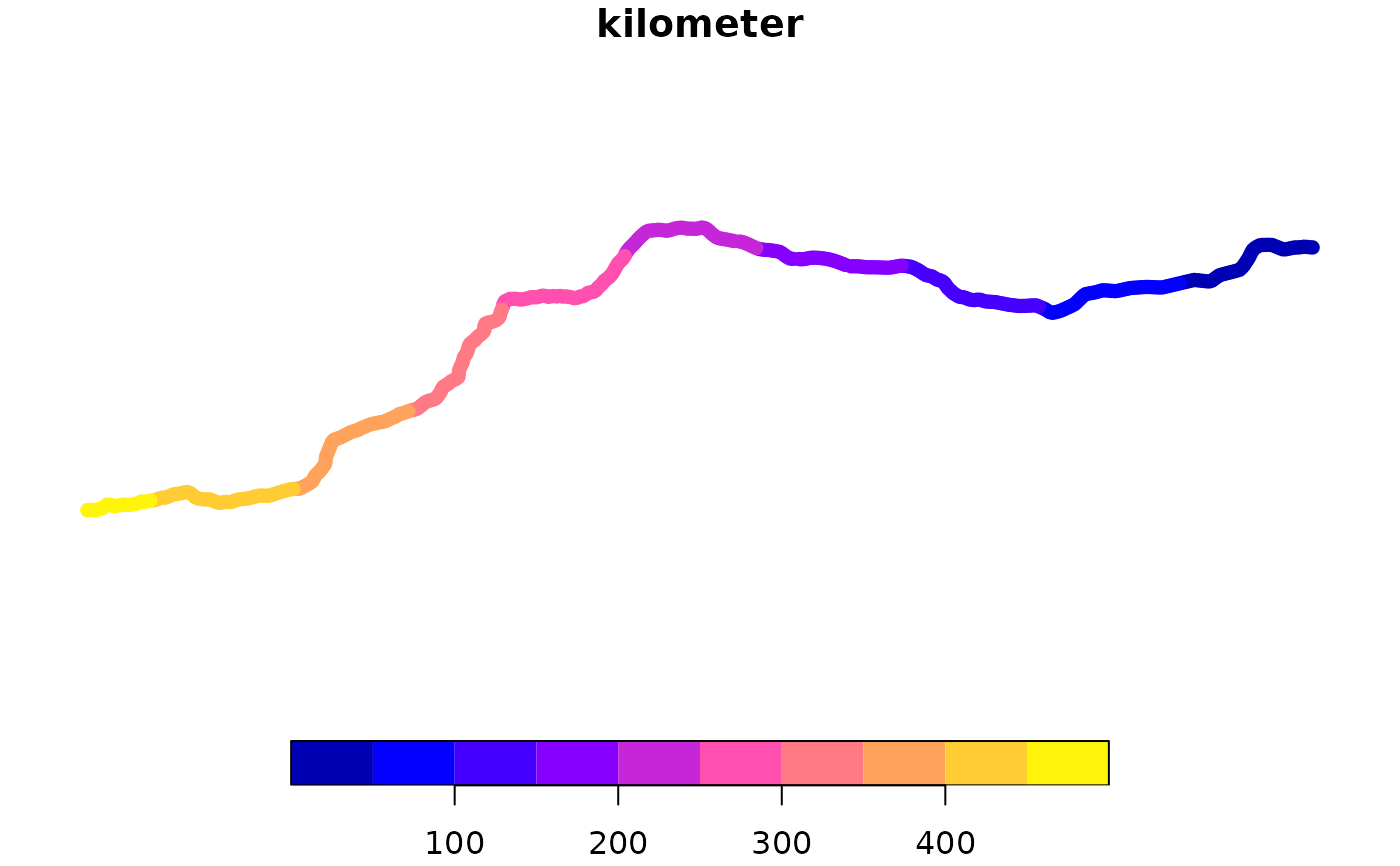Get kilometrages of German federal motorways. Kilometrages are markers for each kilometer of a highway. They can be used to create linear referencing systems (LRS).
Usage
bkg_kilometrage(
...,
bbox = NULL,
poly = NULL,
predicate = "intersects",
filter = NULL,
epsg = 3035,
properties = NULL,
max = NULL
)Arguments
- ...
Used to construct CQL filters. Dot arguments accept an R-like syntax that is converted to CQL queries internally. These queries basically consist of a property name on the left, an aribtrary vector on the right, and an operator that links both sides. If multiple queries are provided, they will be chained with
AND. The following operators and their respective equivalents in CQL and XML are supported:R CQL XML ===PropertyIsEqualTo!=<>PropertyIsNotEqualTo<<PropertyIsLessThan>>PropertyIsGreaterThan>=>=PropertyIsGreaterThanOrEqualTo<=<=PropertyIsLessThanOrEqualTo%LIKE%LIKEPropertyIsLike%ILIKE%ILIKE%in%INPropertyIsEqualToandOrTo construct more complex queries, you can use the
filterargument to pass CQL queries directly. Also note that you can switch between CQL and XML queries usingoptions(ffm_query_language = "xml"). See alsowfs_filter.- bbox
An sf geometry or a boundary box vector of the format
c(xmin, ymin, xmax, ymax). Used as a geometric filter to include only those geometries that relate tobboxaccording to the predicate specified inpredicate. If an sf geometry is provided, coordinates are automatically transformed to ESPG:25832 (the default CRS), otherwise they are expected to be in EPSG:25832.- poly
An sf geometry. Used as a geometric filter to include only those geometries that relate to
polyaccording to the predicate specified inpredicate. Coordinates are automatically transformed to ESPG:25832 (the default CRS).- predicate
A spatial predicate that is used to relate the output geometries with the object specified in
bboxorpoly. For example, ifpredicate = "within", andbboxis specified, returns only those geometries that lie withinbbox. Can be one of"equals","disjoint","intersects","touches","crosses","within","contains","overlaps","relate","dwithin", or"beyond". Defaults to"intersects".- filter
A character string containing a valid CQL or XML filter. This string is appended to the query constructed through
.... Use this argument to construct more complex filters. Defaults toNULL.- epsg
An EPSG code specifying a coordinate reference system of the output. If you're unsure what this means, try running
sf::st_crs(...)$epsgon a spatial object that you are working with. Defaults to 3035.- properties
Vector of columns to include in the output.
- max
Maximum number of results to return.
Value
A dataframe containing the following columns:
name: Geographical name of the POIgemeinde: Municipality nameverwaltung: Administrative association namekreis: District nameregierungs: Government region namebundesland: Federal state namebez: Label of the federal motorwaykilometer: Kilometrage of the motorwayrichtung: Direction of the kilometrage
Query language
By default, WFS requests use CQL (Contextual Query Language) queries for
simplicity. CQL queries only work together with GET requests. This means
that when the URL is longer than 2048 characters, they fail.
While POST requests are much more flexible and able to accommodate long
queries, XML is really a pain to work with and I'm not confident in my
approach to construct XML queries. You can control whether to send GET or
POST requests by setting options(ffm_query_language = "XML")
or options(ffm_query_language = "CQL").
See also
The rLFT package for linear referencing
Other points of interest:
bkg_airports(),
bkg_crossings(),
bkg_heliports(),
bkg_seaports(),
bkg_stations(),
bkg_trauma_centers()
Examples
# Get the kilometrage of the A2 motorway
a2 <- bkg_kilometrage(bez == "A2")
plot(a2["kilometer"], pch = 16)

